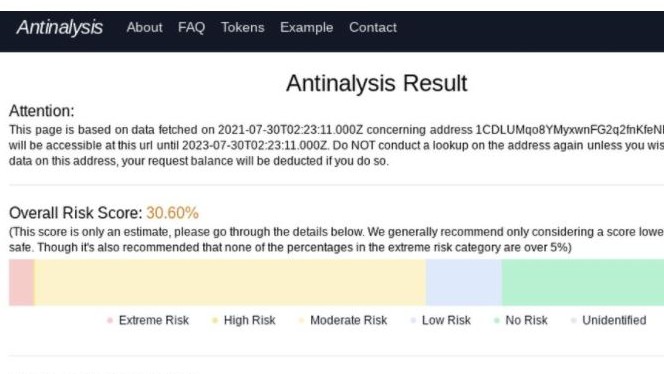“Follow bitcoin” has been the mantra of investigators looking for criminals for generations. This battle has been raging for years between criminals and authorities in cyberspace, only now the bad guys are winning?
Despite the anonymity of cryptocurrencies, dozens of cybercriminals have been caught in the last two years thanks to new techniques to track their money on the cryptocurrency blockchain – a public list of all transactions between wallets.
But could the tables be turning? A new service is being sold on the darknet that offers criminals the chance to check how “clean” their digital coins are.
“What we’re seeing is that criminals are starting to cut back on blockchain analysis, and this service is the first,” explained Dr Tom Robinson, chief researcher and founder of analytics provider Elliptic, who discovered the website. “It’s called Antinalysis, and criminals can now check their Bitcoin wallets and see if the authorities are looking at them for criminal activity,” said Dr Robinson.
According to Elliptic, the discovery shows how sophisticated cybercrime networks have become and how (unsurprisingly) criminals fear being caught. “This is a special technique. If the funds are contaminated, we can do further money laundering and try to remove the link to the crime until we have clean coins,” the researcher revealed the essence of the system.
Dr Robinson says this is a worrying new trend that could make his and law enforcement agencies work more difficult. But fortunately, the institute’s researchers say the service is not currently working too well. “It hasn’t been very good at identifying links to criminal sites. But it will inevitably improve over time. So I think it will be a significant capability for criminals and money launderers in the future,” the analyst warned.
Global manhunt
Governments worldwide, including in China, the UAE and the UK, are trying to tackle the growing problem of money laundering through cryptocurrencies. Tracking cryptocurrencies has already led to high-profile arrests – such as US teenager Graham Ivan Clark, who is currently in jail for masterminding one of the biggest social media hacks.
Clark found a way to take over the Twitter accounts of dozens of celebrities, including Kim Kardashian, Elon Musk, Bill Gates and Joe Biden. Clark and his hacking team then tweeted an advertisement for a cryptocurrency scam and received hundreds of referrals from the public, hoping to cash in on the fake donation. Clark made more than $100,000 in a few hours, which he immediately started covering his tracks.
But that didn’t work. In the indictment against him, the US Department of Justice wrote that officials successfully analysed the blockchain and re-anonymised the Bitcoin transactions, which allowed the hackers to be identified. Clark, now 18, pleaded guilty and received three years in a Florida prison.
Not very PC.
Another trend that worries authorities is the growing popularity of so-called privacy coins. These are cryptocurrencies, such as Monero, that offer greater anonymity than mainstream coins such as Bitcoin. In some extortion cases, hackers ask victims to pay with these coins in exchange for a discount.
This is another trend that is not yet widespread, and according to Kim Grauer, research director at cryptocurrency analytics firm Chainalysis, this method has its drawbacks for criminals. “Privacy coins have not been adopted as much as we would expect. The primary reason is that they are not as liquid as Bitcoin and other cryptocurrencies. “Cryptocurrencies are only useful if you can buy and sell goods and services or redeem them for mainstream money, and this is much more difficult with privacy coins,” the institute’s head pointed out.
Source: BBC News



















Leave a Reply